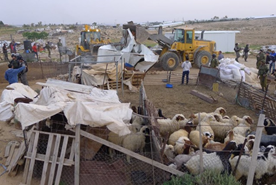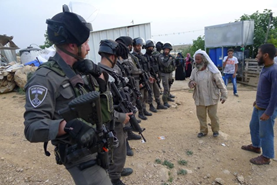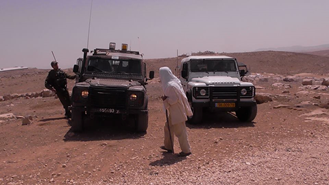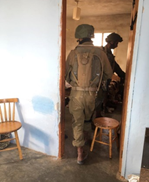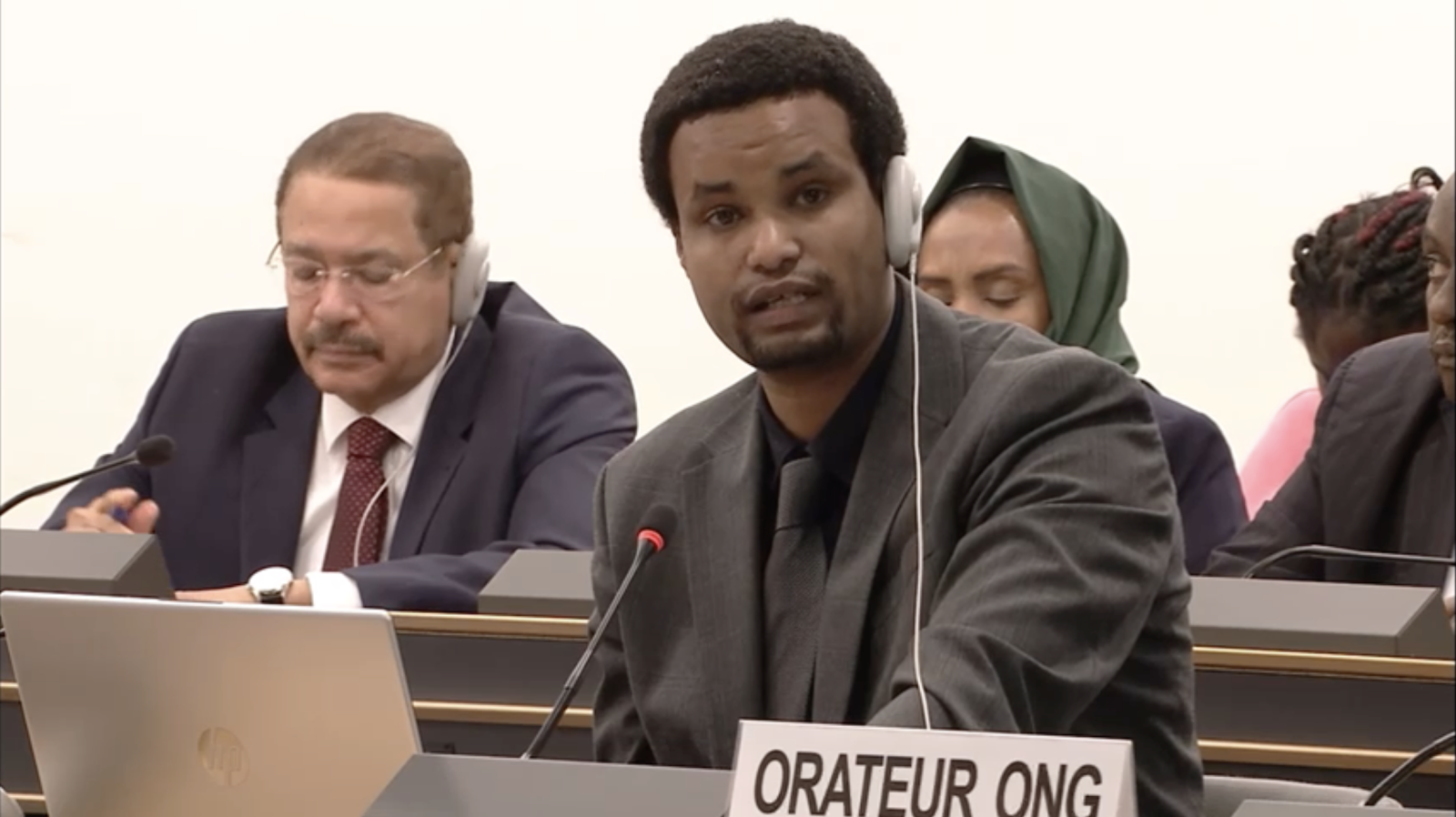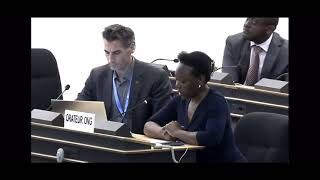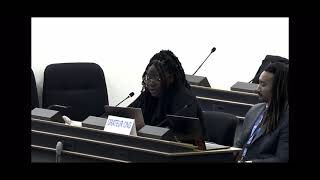Settler violence is a daily part of life for many Palestinians: Armed Israeli settlers regularly carry out attacks against Palestinian civilians and property by, inter alia, shooting and harassing Palestinians and damaging and destroying their belongings. Instead of intervening, Israeli soldiers usually stand idly by or even partake in violence against Palestinians. Settlers and soldiers are endowed with impunity by the Israeli State. The community from the Palestinian South Hebronite village of Um Al-Khair of Tariq Hathaleen, young activist and GICJ correspondent, has to lead a life in the presence of the Israeli settlers of the nearby illegal “Carmel” settlement established in 1981. The following incidents reveal how traditional agricultural and nomad activities and earning livelihood have become arduous endeavors, how liberty, safety and dignity of person is shaken, and how life is disrupted and rendered unbearable under the rule of one population over the other established by the belligerent Occupying Power Israel. Tariq recounts three incidents that keep haunting his family and the community of Um Al-Khair.
The Loss of a Brother
“One day in the winter of 2000, when my oldest brother, Mohammed Salim Hathaleen, was 18 years old, he went shepherding with our herd. As the herd was grazing beside the fence of the nearby “Carmel” settlement, an Israeli “security” guard saw my brother and immediately retrieved his gun to shoot at him. The bullet missed Mohammed’s head by inches and he escaped and ran back to the village. The guard alerted the Israeli military, which shackled Mohammed. The guard started beating him on the head with his weapon – which left my family and the village in shock –and thundered in Hebrew: ‘I will make everyone in this village a handicapped person’. Since that day, my brother has been suffering from physical and mental illness and requires a lot of care. As he sustained substantial brain damage, he is handicapped and only eats, sleeps, and stays with my family. In 2013, the Israeli military and Civil Administration confiscated a toilet donated by the European Union that was designed especially for Muhammed. My brother has been suffering tremendously ever since the attack and became very violent. My sister is taking care of him around the clock. I feel that we lost my oldest brother Mohammed on that day.”
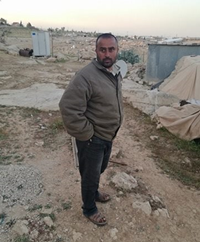
Mohammed Salim Hathaleen stands in the landscape of Um Al-Khair
Donkey’s Years
“One day in the year 2008, my mother in law, Khadra Suleiman Hathaleen, was looking for her escaped donkey in the village and in the area around us. When she discovered the donkey inside the illegal settlement, exactly in the new neighborhood that was built on our land in 2005, she tried to enter the settlement to get out the donkey. As the settlement does not have a fence, the donkey had entered effortlessly. Trying to get the donkey, Khadra stepped a few meters inside the settlement. Suddenly, one of the settlers from the violent neighborhood started shooting at the old woman – maybe to kill her or to horrify her. Khadra started running away, while the settler kept shooting. Luckily, the bullets did not hit my mother in law.
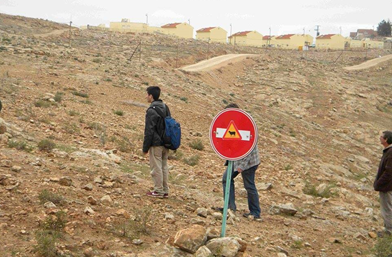
Ta'ayush activists escort the shepherds of Um Al-Khair to protect them after the settler attack on the shepherds from the new neighborhood. In the background, the new settlement neighborhood of “Carmel” housing extremist settlers can be seen.
The sign has been established by settlers put to prevent the shepherds and their flocks from accessing private Palestinian land owned by Tariq’s family.
Having left the settlement behind her, she collapsed. The people from my village came to form a circle around Khadra to protect her from being attacked again and to calm her down. The settler called the Israeli police, who, after having searched the place and having ordered doctors to examine my mother in law, arrested Khadra and took her to the police station for investigation. The settler, on the other hand, was not even taken to the police station. My mother in law often remembers this harmful story, which has gravely affected her mental wellbeing.”
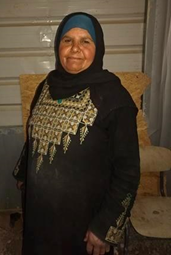
Khadra Suleiman Hathaleen at home in Um Al-Khair.
The Price of Earning Livelihood
“In February 2011, several people from my village went shepherding on our grazing land together when suddenly the settlers approached the herd and started beating and throwing stones at the villagers and the animals. The people from my community assembled at the site. Among them was my uncle’s wife Maliha Hamad Hathaleen, who tried to protect the sheep from the stones. One of the settlers beat her on her head with his bare hand and she collapsed. Her son, Khaire Hathaleen, wanted to defend his mother from the settler’s attack. However, another villager stopped him because we cannot react to any violence by Israeli settlers or soldiers occurring in the village.
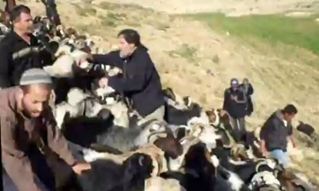
The photo shows the assault on the sheep by the settlers of “Carmel” on 24 January 2014.
When the police came, they arrested Khaire because the settler claimed that he had wanted to attack the settlers. My cousin was forced to pay 2000 shekels, after Israeli forces had taken him to the police station, had investigated, beaten, and threatened him that they would come to the village to arrest, beat and maybe shoot him. Although doctors did not discover any permanent injury when examining Maliha, my family believes that her extreme headaches, which are strongest during cold winter days, result from the settler attack.”
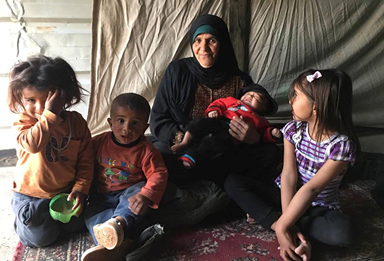
Maliha Hathaleen with her grandchildren.
Climate of Violence
As Tariq’s family, many Palestinians pay a high price – often with their lives – for following their traditional means of earning livelihood and for simply seeking to lead their lives. While settler violence poses a constant threat, Palestinians cannot count on protection by Israeli forces but rather witness that these do not intervene, persecute and arrest the victims, or engage in violent acts against Palestinians themselves, including through the use of excessive and lethal force. The conjunction of violence by Israeli settlers, soldiers and police and the utmost impunity they enjoy has created an atmosphere of terror among the Palestinian population since the beginning of the occupation. This adds to the climate of violence in which Palestinians live and inflicts unquantifiable psychological harm on Palestinians, especially on children who witness their parents being beaten or murdered and their homes being destroyed.
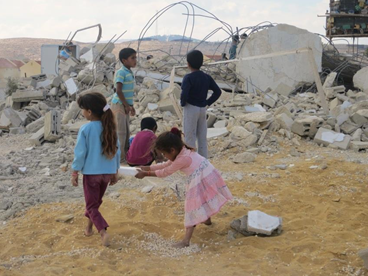 |
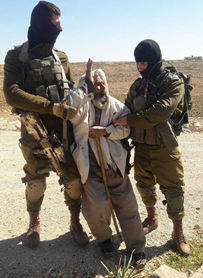 |
Left: The children of Um Al-Khair play in the ruins of their homes demolished for the sixth time on 27 October 2014. Right: The Israeli Civil Administration accompanied by soldiers gives demolition orders for three buildings on 4 April 2017, to be executed in a week’s time. This will be the eleventh time the village faces home demolitions. In the photo, Tariq’s uncle Suleiman Eid Hathaleen is captured by soldiers for protesting the orders.
The described incidents are not the only crimes by the settlers Tariq’s community had to live and will not be the last if the international community does not take immediate measures to hold Israel accountable, to cease its violations and prevent violence by settlers and soldiers, and to conduct investigations and guarantee accountability for illegal actions. Tariq and his family are still waiting for justice.
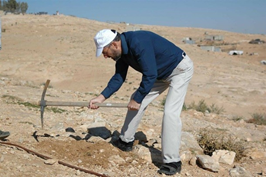
The “security” guard of the illegal “Carmel” settlement who attacked Tariq’s brother can be seen planting olive trees on the Palestinian family’s private land in late 2011, a day before the settler attack on the shepherds.
|
The Israeli military demolishes six family homes in Um Al-Khair on 6 April 2016. |
Tariq’s uncle Suleiman Eid Hathaleen and other villagers are confronted with vast military presence during the home demolitions. |
|
In 2016, the Israeli Civil Administration and military visited the village several times, declaring that it had new demolition orders. |
The Israeli army searches the houses of the Palestinian residents on 9 December 2016 to arrest Tariq for having filmed the construction of a sewage pipe in “Carmel” which would pour into the village’s farming land. |




